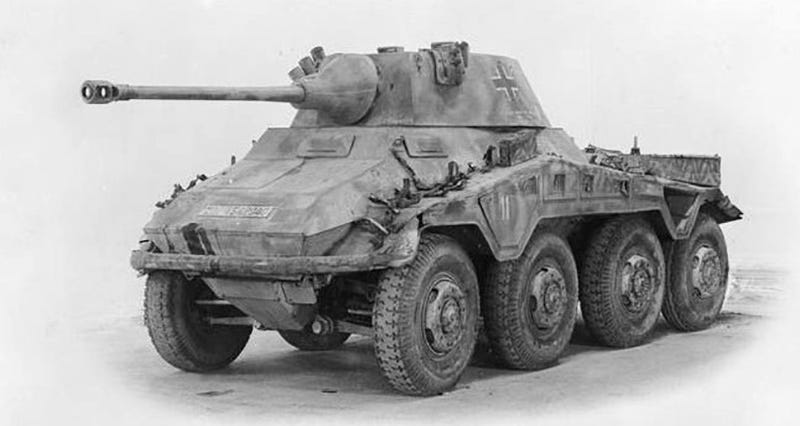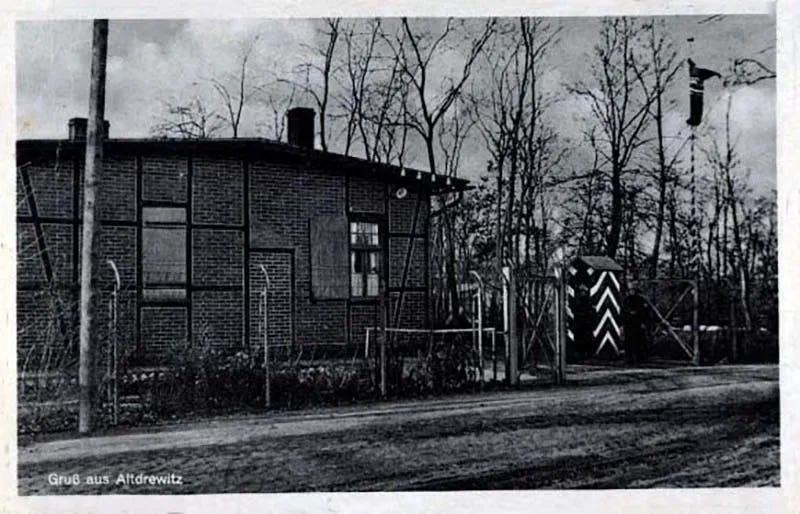'Panzer Leader'
A German soldier's account of leading a reconnaissance unit as they encounter the US Army probing forward into Germany

Otto Henning was still only nineteen in 1944 but already an experienced soldier, a veteran of North Africa and now a member of the Panzer Lehr Division. The elite ‘tank teaching’ division was formed from training and demonstration units at the beginning of 1944 - and was the only fully motorised armoured formation in the Wehrmacht.
So Henning’s perspective is one of a professional soldier trying to resist the onslaught of the vastly better-equipped Allies. As a reconnaissance unit commander, he often found his movements restricted by Allied air superiority.
Panzer Leader: Memoirs of an Armoured Car Commander, 1944–1945 describes the campaign in Normandy, the escape back to Germany and then the final months of fighting in Germany, including Hitler’s last attempt to attack from the Ardennes, which became known as the ‘Battle of the Bulge’.
The following excerpt describes some of his experiences in November 1944, first an encounter with local civilians in Alsace-Lorraine on the border between Germany and France, then an encounter with the US Army as they made contact with German forces:
While on patrol between two villages we came across a married couple pulling a small cart. The man wore a Reichsbahn uniform. Keichel stopped him and asked if there were German soldiers in the next village. We were wearing camouflage combinations and the man did not recognise us as German. He embarked upon an accurate description of the places still held by the Germans, their strengths and which bases their reconnaissance vehicles operated from.
I had driven up quite close and could hear every word. The wife now got involved in the conversation and said excitedly how happy they were that the Americans had come at last and were hunting the damned Germans to the devil. Keichel was initially speechless, then grabbed the man’s collar and called him a traitor, a man wearing German railway uniform with the eagle and swastika on the cap. Did he know what we did with traitors today? Both suddenly recognised the danger they had talked themselves into and went to pieces. The woman whimpered and the railway trousers trembled at the knees. In disgust Keichel told them, ‘Go to the devil’ and then gave his driver the order ‘March!’.
Even now I still do not know what to make of it. Are the bilingual people of Alsace more in favour of being part of France or Germany? In my Afrika Korps company we had armoured infantry carriers bearing the legend ‘Elsäss und Lothringen’ – Alsace and Lorraine. In my present company I had often talked to Alsatian people and never heard them speak deprecatingly of the worsening political situation. In the radio panzer we listened regularly to the forbidden enemy broadcasts. Probably it is always the case in border provinces that when one side gets the upper hand in war, the inner conviction tends to wander into the victor’s camp. (When our battalion retreated from Alsace, our Alsatian colleagues all suddenly disappeared.)
…
On another patrol our vehicles were unprotected and about 100 metres from a railway embankment. Keichel was at the radio panzer dictating a signal for the radio operator to transmit to Battalion.
Suddenly two enemy fighter-bombers roared over us at low level, banked high and we saw at once that they had seen us. We sprintedto our vehicles and headed at full pelt for the railway bridge. The two aircraft had turned and made for our starting position but could not find us since we were now under cover. They did not give up so easily and came round the other side of the embankment to attack. Still unable to see us under the bridge they opened fire anyway. We anticipated this move and had pulled back sufficiently to watch their MG rounds kicking up clouds of dust in front of us. They tried the same thing from the other side again but we merely shifted our position under the bridge and frustrated them anew. Luckily for us they had no bombs.
I certainly would not have wanted to have been at the mercy of these two bloodthirsty leeches in open country, for then we should never have got away with it.
After some initial successes, the Panzer Lehr Division clashed with the US Third Army and was forced on the defensive. This was the army of General Patton, our adversary from Tunisia in 1943. Our patrol now drove to call on various security positions. On a ridge we saw Luftwaffe ground forces for the first time, a field unit digging slit trenches.
To the south a country lane lined with bushes, hedges and sporadic trees ran down into a valley. Keichel put both gun wagons under cover along this lane for safety and then went to the Luftwaffe command post. We also knew that in the valley, panzer-grenadiers from our battalion were guarding access along the approach road.
Being trained reconnaissance men we always kept our surroundings under close observation and at once through binoculars I saw a few American tanks and a howitzer battery moving into position on a distant ridge. On our own ridge some NCOs were walking about as though on some airfield at a Luftwaffe base. I drew the attention of a warrant officer to the danger they were courting if they continued to wander around in the open. He was not really interested and so they carried on as before with the Luftwaffe soldiers going from trench to trench and standing around in groups smoking.
When a Luftwaffe corporal came to our vehicle I pointed out the danger but again I met nonchalant indifference and he replied, ‘Don’t shit your pants in your tin can.’ His attitude took my breath away and I retorted, ‘Take care, the Americans will soon winkle you out of your trenches.’
With a glance at the enemy howitzer batteryon the peak opposite I saw that it would not be long before they put an end to the peaceful comings and goings on this side of the uplands, and I warned my crews, ‘Nobody leave his vehicle!’
After a while we saw flashes from the American guns. We kept our heads down and soon the 15.5cm shells arrived and exploded all along our ridge. They sent over only three salvoes before all fell quiet, except for the shouting for medics. Keichel came running up to find out what had happened, but we were in the sunken road out of harm’s way while the Luftwaffe warriors were pouring out of their trenches looking shocked and bewildered.
Keichel returned to the command post while we guarded the sunken road towards the south. Shooting with infantry weapons in the valley became louder. After a while some grenadiers came panting up, firing back at where they had come from, and went to ground nearby. I checked our field of fire and the line of retreat.
Finally some Americans in their typical rounded steel helmets came in sight and we opened fire with both 2cm cannon and the MG 42s, supported by the panzer-grenadiers near and behind us. This forced the Americans to pull back, pursued by the grenadiers firing at them at the gallop. Keichel reappeared, but by now the danger had passed. Radio signals were sent, and after a pause our new orders were morsed over.
Returning from a patrol we were given quarters in private houses in Haguenau, where we thought we might spend a few hours of peace and quiet. During the hours of darkness, however, the town came under continuous enemy artillery fire forcing us to shelter all night in the cellars with the occupants. The Americans had probably taken bearings on our battalion’s radio stations and called out their night shift. Our cellar had extra support from planking but we thought a direct hit would probably come right through.
As front veterans we did not like to cower defenceless and unprotected in the cellars of civilian houses, but how much worse was it for the women and children, crying and screaming, clinging to us desperately when near-misses blew out the candles. Next day we surveyed the damage. A column of cyclists had chained all their machines together against the wall of a house, a shell had hit and now the machines lay in a tangle of metal tubing.
Colleagues from my company described how a shell had penetrated the cellar roof and come to rest hanging down between the bracing struts of the cellar supports. In shock everybody had scampered out into the street. They were very lucky. Again and again one heard the most incredible things which happen in wartime.
© Otto Henning 2008 and 2022, 'Panzer Leader: Memoirs of an Armoured Car Commander, 1944–1945'. Reproduced courtesy of Pen & Sword Publishers Ltd.
Affiliate Links
Recently on World War II Today ...
There was a lively debate within the committee about how to dispose of the dead man. Joe was angry because the question should have been answered before Websky was executed. What’s the problem? said Coleman’s staff. Just leave him in the hole. The committee objected: dammit, when Schultz misses Websky, any fresh dirt in the compound will be dug up. We can’t tamp down the earth enough to fool the krauts - they’d had a lot of experience in uncovering British tunnels.
US POWs uncover a mole
When we were still about three hundred yards offshore, some 20-millimetre cannon opened up somewhere on the left. The red streaks of tracer swooshed and cracked a few feet over the craft. We felt like Aunt Sally at the fair, with our heads sticking up above the sides of the L.C.A. as we peered at the outline of the landing-ground drawing nearer. Machine-guns joined in with the cannon-fire from the left, but they too were firing high.




